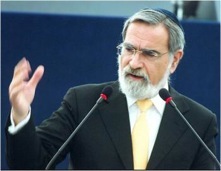
I got lucky again at lunch on Monday, the last day of the Chief Rabbi’s Atlanta visit, when I was seated next to him. Lady Elaine was present, as were some Emory Law students–the event being hosted by the Emory Center for the Study of Law and Religion. The Chief Rabbi made some observations about the differences between the American and British polities, and said he had informed top officials in the U.K. that they had some lessons to learn from us. “About what?” I wondered aloud, and the students were clearly interested.
“About covenant.” Reasoning that he probably didn’t mean the Abrahamic covenant, I had the sense to keep my mouth shut, except for forking salad into it. The students looked puzzled. “You know, when you go to Washington D.C. and visit the monuments, you see on every one of them something that you never see on a monument in Britain.”
Long pause.
“Texts. Every statue has a text. Visit the Jefferson Memorial and what do you see on the rotunda all around above the figure of the president? ‘I have sworn on the altar of God eternal hostility against every form of tyranny over the mind of man.’” I remembered being there and almost growing dizzy reading those words as I turned under the icon.
“You go to the Lincoln Memorial,” the Rabbi continued. “You gaze up at this massive stone carving of the man, but then you look to either side and you see the complete text of the Gettysburg Address on one side and the Second Inaugural on the other.
“And the new Roosevelt Memorial. It has a life-size bronze of him in his wheelchair,” a choice that stirred much controversy. “But each of the six decades of his political life is illustrated with a text from one of his speeches in that era.” He seemed now to be thinking about how to remain diplomatic while criticizing his own country.
“In Britain, the monuments have no texts. Even Churchill, whose eloquence arguably saved the nation, is memorialized only by a statue of the man. We need a covenant in Britain like the one you have in America. We need to develop a tradition based on texts.”
I thought, but did not say–the students were Christian–How very Jewish. Monumental statues, including Roosevelt in his wheelchair, can inspire a kind of idol worship. But if you have to stop, read a text, and consider its meaning–and if the text is inspiring enough–you will feel as if the man behind the stone or bronze is speaking those words to you. It’s a living connection. And you know immediately how much more important the words are than the shape of the man–that the words, in fact, made the man.
In America’s founding, great trouble was taken to keep men, living or dead, from becoming idols. The Declaration of Independence, the Constitution–Britain doesn’t have one–and the Bill of Rights emerged as covenantal documents, words by which Americans would be bound to each other. Little wonder that the Founders’ generation resorted to imagery of the Exodus from slavery in idolatrous, tyrannical Egypt to the covenant freely chosen in the desert, binding the former slaves to an unseen yet all-seeing God, and leading in the end to a Promised Land.
The Rabbi’s incisive observations reminded me of a formal address he had given, a few weeks before I met him at the end of 2008. It was no less than a speech to the European Parliament, the body that all hoped would herald a new century something like the opposite of the previous one for Europe, laid waste by generations of war.
What, I wondered, as I began reading the speech on the train from Warwick to London to visit him, would this great Jewish spiritual leader choose to say to the assembled nations of Europe?
It was eloquent throughout, but the culmination, unsurprisingly, was an interpretation of text. “As I read the Hebrew Bible,” he said, “I hear from the very beginning God’s call to dialogue.” His prime example was Abel’s murder. Unlike most Bibles, the Rabbi gave his multilingual audience a literal translation of the Hebrew:
“'And Cain said to Abel, and it came to pass when they were out in the field that Cain rose up against Abel and killed him.'
“You can see immediately why it cannot be translated because it says ‘And Cain said’, but it does not say what he said. The sentence is ungrammatical. The syntax is fractured … the Bible is signalling in the most dramatic way – in a broken sentence – that the conversation broke down… or to put it simply: where words end, violence begins. Dialogue is the only way to defeat the worst angels of our nature.”
Rabbi Sacks went on to tell them that six days before the speech, he and the Archbishop of Canterbury had led a delegation, consisting of faith leaders in Britain–Muslim, Hindu, Sikh, Buddhist, Jain, Zoroastrian, Baha’i, to spend a day at Auschwitz.
“There we wept together, and there we prayed together, knowing what happens when we fail to honour the humanity of those not like us. God has given us many languages and many cultures, but only one world in which to live together, and it is getting smaller every day. May we, the countries and the cultures of Europe, in all our glorious diversity, together write a new European covenant of hope.”
The transcript records that, “The House accorded the speaker a standing ovation.” They were moved, and rightly so. We must hope against hope that this covenant of hope will hold, that the dialogue with those who are not quite like us will never again break down.

What a moving and beautiful reading of the story of Cain and Abel.
Thank you, Mel, for bringing it to your readers.